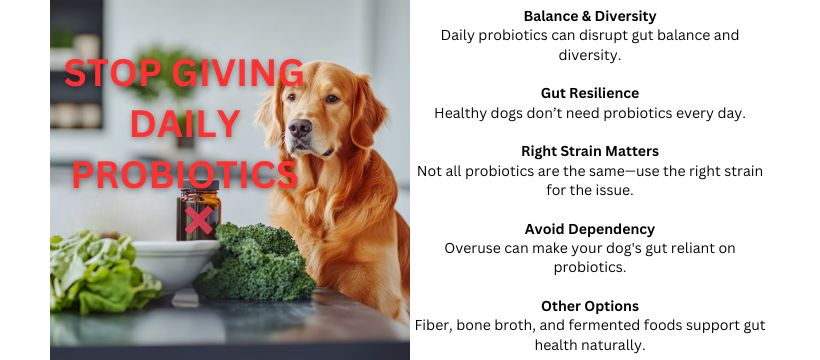Probiotics are often seen as a magic bullet for a dog’s digestive woes. While they can be incredibly helpful, it’s important to understand that their daily use may not be necessary if your dog is already in good health. In fact, overusing probiotics can do more harm than good.
When we talk about gut health, diversity and balance are key. Probiotics are designed to restore balance when the gut flora is off-kilter, such as after a course of antibiotics or during a bout of diarrhea. Giving them every day to a healthy dog can upset this diversity and balance, leading to an overgrowth of certain bacteria. Essentially, you could be creating a new problem while trying to prevent one.

Think of your dog’s gut like a bustling city full of different communities that need to coexist for everything to run smoothly. Constantly adding the same types of bacteria through daily probiotics can overshadow this diversity. This reduces the natural variety within the gut, which can lead to long-term health issues.
Let’s say your dog is in tip-top shape with no digestive issues, even at times with acute digestive issues. Daily probiotics are more likely to disrupt the natural environment in the gut rather than support it. You’re introducing an external element that can overshadow the naturally occurring bacteria, which might be just what your dog needs to stay healthy.
So, the next time you’re tempted to add a probiotic to your dog’s daily routine, consider whether it’s really necessary. Keeping a healthy balance and maintaining microbial diversity is crucial. Your dog’s gut is more resilient than you might think and can often maintain itself just fine without daily supplements.
The Variability and Specificity of Probiotics
Not all probiotics are created equal. While it might seem convenient to grab any probiotic off the shelf, it’s important to understand that different strains serve different purposes. Some strains might be great for addressing diarrhea, while others could be more effective for alleviating stress-related digestive issues.
Using a generic probiotic blend may not always address your dog’s specific needs. For instance, if your pup is dealing with stress, you wouldn’t give them a probiotic meant to help with diarrhea. This mismatch can be ineffective and could even make the situation worse.
Strain specificity is vital. Just as you’d choose specific medications for certain illnesses, the same goes for probiotics. Giving the wrong strain too frequently can lead to an overgrowth of particular bacteria, disrupting the gut’s natural balance even further.
One probiotic doesn’t fit all. Research and consult with your vet to determine which strain is appropriate for your dog’s particular condition. For example, the strain Lactobacillus acidophilus may help with upper gastrointestinal digestive health, while Bifidobacterium longum could be more beneficial for stress. Knowing these nuances can make a big difference.
Having the right probiotic could be the key to resolving your dog’s issues without causing extra problems. Get some advice from a vet and see what strains are best suited for your furry friend’s health needs. Doing so ensures a targeted approach, supporting gut health without unwanted side effects.
Dependency and Immune System Concerns
When it comes to gut health, less can often be more. Over-relying on daily probiotics could make your dog’s digestive system lazy, so to speak. Imagine if you always provided external help for simple tasks; eventually, you wouldn’t know how to do them on your own. The same idea applies to your dog’s gut. By constantly supplementing with probiotics, you might hinder its natural ability to regulate itself.
Dogs can easily become dependent on the constant influx of beneficial bacteria. This dependency isn’t just counterproductive; it can create a gut flora that struggles to maintain balance when probiotics aren’t present. This makes it harder for their digestive systems to function optimally on their own.
Think about it: the goal should be to support your dog’s gut so it can maintain its health without needing daily help. Occasional probiotic use can be beneficial, but the daily influx can cause the gut to rely on external support. This dependency might lead to long-term issues when the supplements are withdrawn.
Over-supplementing doesn’t only affect the gut; it can also interfere with your dog’s immune system. Your dog’s body needs to experience small disruptions and adapt to them to maintain a robust immune system. Overloading it with probiotics can prevent these natural adaptations, leaving your dog potentially more vulnerable to health issues when faced with challenges. Allowing the gut to experience natural fluctuations in bacteria helps build a strong, resilient immune system, capable of handling various disruptions without always relying on supplements.
So, before reaching for that probiotic every day, consider the bigger picture. Support your dog’s gut health by encouraging natural balance and adaptability. Let their bodies do what they’ve been naturally designed to do.

Holistic Alternatives to Daily Probiotics
Daily probiotics aren’t the only way to support your dog’s gut health. There are plenty of holistic alternatives that can be just as effective, if not more so. One of the best ways is through nutrition, specifically incorporating prebiotics into their diet. Prebiotics are types of fiber that feed the good bacteria already in your dog’s gut, fostering a healthy microbial environment.
Bone broth is another fantastic option. Rich in collagen and other essential nutrients, bone broth helps heal and maintain the gut lining. It’s a natural and tasty addition to your dog’s diet that can provide robust support for digestive health.
Fermented foods can significantly improve a dog’s gut health by introducing natural probiotics, digestive enzymes, and bioactive compounds. They enhance gut lining integrity, reduce inflammation, and regulate bowel movements, making them beneficial for dogs with digestive issues. Safe options like fermented vegetables (sauerkraut), kefir, and fermented fish can be gradually introduced in moderation, offering a natural boost to a dog’s overall digestive and immune health.
A varied diet can also work wonders. Offering a mix of fresh, whole ingredients not only provides a range of nutrients but also introduces different types of bacteria that contribute to a diverse and balanced gut microbiome. Including fiber-rich veggies like kale, spinach, and broccoli can encourage the growth of beneficial bacteria, ensuring your dog’s gut remains strong and healthy.
Holistic options offer a balanced approach to gut health without the risk of over-reliance on supplements. Incorporating these alternatives can uphold a healthy gut microbiome and enhance overall well-being without the need for daily probiotics.